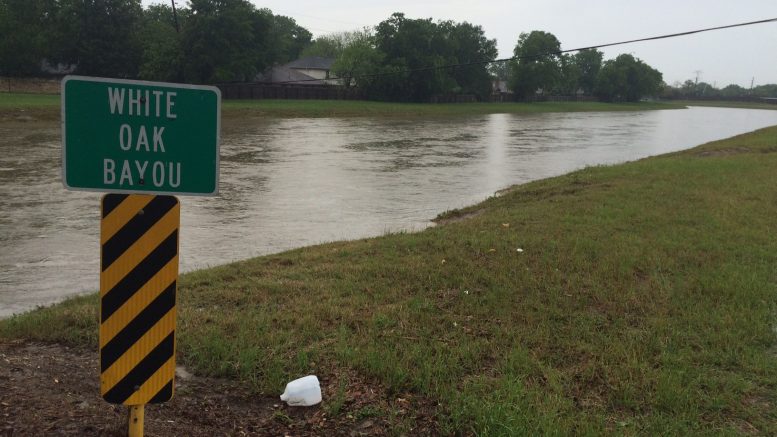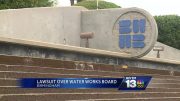The Texas Supreme Court dealt a blow Friday to hundreds of families whose homes were ruined by 1998’s Tropical Storm Frances, 2001’s Tropical Storm Allison and a 2002 flooding event.
The high court dismissed a class-action lawsuit that Edward and Norma Jean Kerr filed 15 years ago against the Harris County Flood Control District on behalf of roughly 400 families, claiming that the district essentially turned their Jersey Village neighborhood near the White Oak Bayou into a stormwater detention basin for upstream commercial developments. The Kerrs blamed the flooding on the district’s failure to complete regional flood plans that had been in the works for years. They also alleged the district failed to enforce its own policy requiring upstream commercial developers to build their own stormwater detention ponds.
Because the district had known about the flooding risks since as early as 1976, according to court documents, the plaintiffs argued that its lack of action to protect them from substantial flooding should make the district liable for property damages the homeowners incurred. The Kerrs, for example, faced roughly $80,000 in damages following Allison in 2001 — and that was with flood insurance.
Prominent Houston environmental attorney Jim Blackburn, who represented the plaintiffs, told us back then, “My view is, the county was just hoping people wouldn’t flood. I don’t think hoping people won’t flood is sufficient to get around liability under the Texas Constitution.”
However, the Supreme Court on Friday ruled that it doesn’t see how the county could have known about possible floods while approving development plans and saw no major flaws with the White Oak Bayou regional flood-control plan. Therefore, the court concluded, county officials should not be at fault.
Harris County Attorney Vince Ryan, in a statement, celebrated the victory. Ryan said a ruling in favor of the homeowners would have discouraged governments from developing further flood-control plans for “fear of possible liability claims.”
Residents affected by past and recent flooding in Harris County, however, may find Ryan’s reaction tone-deaf.
The Supreme Court ruling comes amid even more outrage from Houstonians following the April and May flooding events that led President Barack Obama to twice issue a disaster declaration in Harris County. More than 10,000 families have been approved for FEMA assistance since April 24, tallying more than $60 million in federal relief funds. And dozens of residents have again blamed city and county leaders for failing to do more to prevent the flooding.
After the Memorial Day flood event in 2015, the Houston Press‘s Steven Jansen reported on the federal flood-prevention project along Brays Bayou that had somehow managed to fall eight years behind, despite the threat of a looming 100-year flood (or multiple, as we have now learned). After the April 18 flood,he revisited the Meyerland residents — who now feel as if they are the detention pond for the Texas Medical Center, also thanks to what they believe are development and planning failures.
Most recently, just before Memorial Day weekend (and yet another flooding event), Residents Against Flooding filed a lawsuit against the City of Houston and Memorial City’s redevelopment authority, arguing the city approved commercial developments in the area without thinking about flood prevention for nearby residential areas.
Sat., Jul. 30, 7:30pm Sun., Jul. 31, 7:45pm
Mary Conner, who is representing Residents Against Flooding in the new case, disagreed with the Supreme Court’s ruling Friday. She said citizens have long been angry over local flood-control plans.
“What people want to hear is not for the government to wave their hands and say, ‘Leave me alone; I’m not at fault,’ but for the government to say, ‘Gosh, this is a real problem — we’re gonna find a solution,’” Conner said.
Conner cautioned against any comparisons of the Residents Against Flooding lawsuit to the Kerrs’ class-action suit. For one, Residents Against Flooding is not asking for any money — it’s asking the city to take action and fix flooding infrastructure problems.
While the class action claimed that Harris County essentially “took” the residents’ property because it was liable for the flooding, RAF is arguing the city arbitrarily chose to protect commercial developers from flooding but did nothing to protect nearby residents. The group believes that in doing so, Houston violated the 14th Amendment, which guarantees all citizens equal protection under the law.
Just as the Kerrs argued that Harris County officials knew for decades about the threat of dangerous flooding, Residents Against Flooding claims its efforts to protect commercial developers for the past ten years prove the city knew, too. “So many studies have been done. They know what they need to do,” Conner said. “They need to build some detention ponds. They need to make improvements in drainage. They know the solutions, but they’re not doing them.”
Turner said at a press conference last week he was committed to addressing drainage issues, but could not fix them immediately, and could not promise that the city would not flood again in the meantime.
Source: www.houstonpress.com




